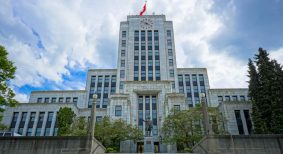British Columbia Construction Association president Chris Atchison said the construction industry should be prepared to be disappointed by the provincial government’s upcoming Budget 2025 announcement.
“Government has telegraphed some areas of sacrifice and disappointment, but as an industry it shouldn’t be (up to) us to bear the brunt of it,” he said. “We shouldn’t stand for it.”
Atchison along Port Coquitlam Mayor Brad West and Impact Public Affairs manager of government relations and strategy Sajjid Lakhani shared insights on political issues impacting the construction industry at the Buildex Vancouver construction keynote.
“For the last several months, we’ve been suspended state of chaos… that provides a certain amount of cover for elected officials to expect no response, a delayed response or lack of commitment is OK because of that uncertainty,” said Atchinson.
He stressed that the industry needs to be “relentless” in what it wants and needs to ensure prosperity not only for their sector but the entire province.
“There’s no question the province is signaling it is entering a period of restraint,” said West. “The challenge is that this is coming at the tail end of the province and Metro Vancouver experiencing unprecedented population growth. The pressure on our infrastructure is enormous. The government has to get their priorities straight.”
When it comes to interprovincial trader barriers and permitting challenges, Atchinson was critical of the ongoing lack of government action. “Interprovincial trade barriers – that could’ve been addressed a long time ago,” he said.
Another example of provincial government inaction is the issue of prompt payment legislation and lien reform. The association has been advocating tirelessly for payment certainty and laid out a road map for the provincial government.
“There is zero cost associated with this,” said Atchinson. “The legislation already exists in Alberta, Ontario and everywhere in between. We are by the far the farthest behind of any jurisdiction in Canada in getting going on this absolute need.”
Lakhani advised that business need to keep politicians accountable and to continue advocating for change so that the “government understands the urgency of the situation we’re in and the contributions your industry makes.”
The threat of U.S. President Trump imposing substantial tariffs is also one of the industry’s top concerns.
“The tariffs are going to have a significant impact. What I hope is we approach this with a level of urgency and vigour required. Government can move effectively and quickly when it wants to,” said West. “Politicians need to put our elbows up a bit… because words are easy but actions are what matters.”
Atchinson said the industry needs to be prepared, “the issue around tariffs is one that will impact the construction industry greatly and it won’t be U.S. tariffs, it will be the retaliatory Canadian tariffs which will have the most dire implications for construction.”
He cautioned that costs will skyrocket on current projects, not just future jobs. “People need to be aware this can have lasting business implications. Make sure you understand your contracts. Start having those difficult conversations with your contractors and owners now. Don’t wait.”
Cheryl Mah is managing editor of Construction Business










